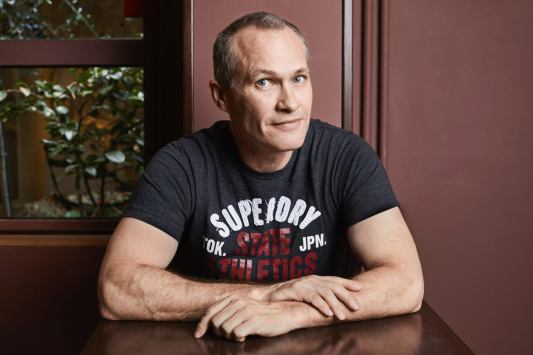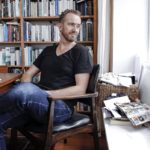David Vann’s a prolific writer currently renovating a boat in California whose books have been published in 23 languages and in more than 50 countries. For the lockdown edition of the Unity Books newsletter (which you can sign up to here) I interviewed him to learn more about his latest novel, Halibut on the Moon, which has been shortlisted to win the $55,000 Jann Medlicott Acorn Prize for Fiction award.
Content warning: The novel we’re discussing is autobiographical fiction centred on his father’s suicide.

What does a day in the life of David Vann look like?
I used to have a great daily routine when I lived in Taupo Bay in the Far North on a ridge overlooking the ocean. I’d wake to the sunrise over the ocean, have cereal, then write for two hours. Then I’d have a salad for lunch and go out on the water on my boat or go hiking or mountain biking into the hills and maybe see friends. Then I’d have dinner and afterward go out to the spa pool on the deck and look at the sunset over the hills in one direction and ocean and islands in the other direction. I’d read and maybe watch a movie and come back out before bed to sit in the spa pool again and watch all the stars in the clear sky.
My life was idyllic. But at the moment I’m building my 50 foot aluminum sailing trimaran in a boatyard in California. It’s surrounded by wine country, very pretty, but I wake and just go straight to work sawing, grinding, and welding aluminum for about 11 or 12 hours, then have dinner and catch up on emails and go to bed. Every once in a while I watch a movie. It’s shelter in place time with the virus, so I don’t see family and friends much. But I actually love building the boat, so although this daily routine is tiring, it’s only for three months and then I’ll be writing and sailing to Hawaii and other pacific islands on my way back to New Zealand.
How do you set yourself up for a day of writing?
I write every day when I don’t have some odd project like building this boat. I’ve written ten books in ten years by doing that. And my setup is just wake up and have cereal and then start. I haven’t had a single day of writer’s block. I always get my page or two, even though each day it seems like I won’t. I read through my previous 20 or 30 pages first, a kind of meditation, and then when it comes time to add something new I think I’ll never write again, but I reread the last page or two and then fire off a paragraph and then keep rereading and writing and within about 45 minutes of the writing I have the page or two and stop and forget about it for the rest of the day. The idea is to have no outline, no plan, no conscious idea where I’m going, so that there can be subconscious pattern and surprises. And they only happen if I sit down every day.
Your book is a breathtaking eye-opener into men’s mental health. What do you hope your books can teach us about that?
I’ve never had any goals to teach readers anything, and in fact I never think of readers because for 22 years of writing I didn’t have any. Legend of a Suicide, my first book, took ten years to write and then another 12 of waiting to get published. But I do think it’s possible for readers to find connections, because what the characters feel and do and say all came as a surprise to me, not planned, and therefore is not fake, not an idea. I think an idea is the worst and most limiting thing that can happen to a writer, and an idea of wanting to affect a reader a certain way might be an even worse idea. The worst and smallest ideas are political ideas, so having a political goal, even one as nice as helping spread awareness of mental health issues, would produce the worst book.
One thing that fascinates me about what comes out in the scenes is that it’s all strange and not me while at the same time being me, so I’ve had all these thoughts and feelings and you’re getting a look into my own mental health. And yet I feel happy and have never felt suicidal, so it’s odd that it could be me.
Have you found that by giving your father a voice in your work you’ve gained more insight and understanding into his struggle with depression and suicide?
That was my hope, to get closer to him and closer to understanding his despair and final moments. I felt I hadn’t come close enough to that in my other books. But what I found in the writing is that after almost 40 years I’ve lost him. The Jim in the book is not really my father anymore, which is sad. I see him in snapshots now, not in motion.
Did you ever contemplate writing an autobiography rather than autobiographical fiction? If so, why did you choose the latter?
I’ve written two sailing memoirs and a nonfiction investigation of a school shooter which included my own growing up with guns. And I wrote a lot for magazines for several years, long articles. What I found is that I don’t like the inflexibility of not being able to make up character or event. I doubt I’ll write much nonfiction again. Fiction is how I can be surprised and find moments of insight and recognition.
Was there a particularly profound memory of you with your father that resurfaced while writing Halibut on the Moon?
I wrote the book because my stepmother told me she saw him right at the end, slept with him, and when he brought his toiletries bag into the hotel room she saw his loaded .44 magnum pistol and was sure it was meant for her, that he was going to kill her before killing himself. This was so disturbing to learn, I couldn’t get the scene out of my head, and that’s why I wrote the book. And along the way, I found many moments of memory with him but also a deeper vacuum of having lost him than I had known before.
How did you feel when you put your pen down, so to speak, and submitted Halibut on the Moon to your publisher?
I really struggled with this book. It took twice as long as the others to write, and I was often upset and crying during the writing. I really felt some of his despair. What’s odd is that although I haven’t felt suicidal, all the things I felt after his suicide are the same things he felt before it. The beginning of bereavement carries all the same signs, in other words, such as insomnia, feeling the world is empty, not being able to re-enter your life to live unconsciously, etc. So I was getting closer to his despair and also reliving the earliest and hardest times of my own bereavement of him. So I was happy to be done.
If you were stuck on a remote island with only one book, what book would it be and why?
That’s a hard one, but I think it would have to be Ovid’s Metamorphoses. It was one of the two greatest hits, along with the Aeneid, right when Jesus would have been a kid, haha, and it has a much more interesting version of Genesis than the Bible does. Like the Bible, it is a compilation of earlier stories, but Ovid is actually a great writer, not a moralizing hack, so it’s unforgettable reading.
How did it feel to find out that you were shortlisted for the Jann Medlicott Acorn Prize for Fiction and did you celebrate?
I was so thrilled, I think because I love New Zealand and I have felt it has been my home for a long time now but I haven’t felt recognized there much for my writing or very connected to any community beyond my immediate friends in the Taupo Bay area. I have loved doing interviews with Kim Hill on RNZ. She’s fantastic. And I loved festivals in Auckland and Wanaka and met great people there, and I also loved a short visiting gig teaching at Victoria University in Wellington, but there’s an odd thing that experimental writing is normal in NZ. It’s not normal anywhere else, and I feel a bit of an outcast among NZ writers because I’m just not interested in experimental writing at all, even though I teach generative devices in fiction etc. I still prefer Greek tragedy and immersion in scenes, and I think ideas are small. So I guess I’m hoping being shortlisted might bring me into contact with other NZ writers and help me to feel a part of a writing community there, and ideally one interested in telling stories.






